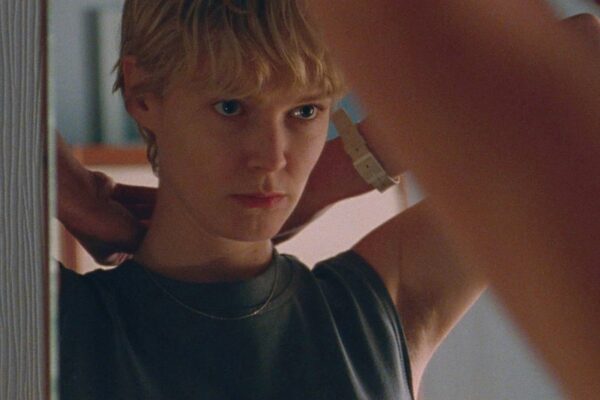Film Review: “Blue Jean” — The Color of Truth
By Peg Aloi
This incisive drama set during the height of Thatcherism doesn’t need to amplify its relevance.
Blue Jean, directed by Georgia Oakley. Screening at Coolidge Corner Theatre

Rosy McEwen in Blue Jean. Photo: Magnolia Pictures
This sure-handed feature debut by British filmmaker Georgia Oakley is a topical period piece set in Thatcher’s England. In Manchester in 1988, Jean (Rosy McEwen) lives alone and follows what seems like a set routine. She watches mindless talk shows on TV, she dyes her short hair blonde, and cooks simple meals. When she’s not teaching Phys Ed or coaching a girl’s basketball team, she heads out to a local lesbian club. There she meets her girlfriend Viv (Kerrie Hayes) and hangs out with her lively friends for evenings of billiards, drinks, cigarettes, and dancing. Jean and Viv have a passionate relationship, but Viv is very open about her sexual preference and identity as a lesbian. Jean prefers to remain more secretive, ostensibly to avoid issues at her job. Via radio and TV snippets we hear that there is an angry movement afoot among conservative government officials to pass strict laws forbidding homosexuality: it has been two decades since the Sexual Offenses Act legalized homosexuality in England in 1967.
Jean is out to her sister Sasha (Aoife Kennan) and brother-in-law. But when she cares for her young nephew, Jean is asked to hide her relationship with Viv. At her sister’s house, we see a framed photo on the mantel; it is a dark-haired Jean in a wedding gown, evidence of a life long since left behind. Jean doesn’t argue when she’s asked to hide who she is. Indeed, her response to the oppressive bigotry closing in around her is to be quiet and circumspect, observing but not protesting. Meanwhile, she has a team full of boisterous teenage girls to contend with. Siobhan (Lydia Page) seems to be vying to be the team star, and that is encouraged by Jean. But being the center of attention emboldens Siobhan to act out in increasingly disruptive ways. The portrayal of teenage girls on the cusp of sexual maturity is handled with frank authenticity, to the point of generating controversy, which can be a fiery issue these days. But it is 1988, a time when conservative blowback — with accompanying crude cultural commentary — had not yet become ubiquitous in cinema or society.
When Lois (Lucy Halliday), a shy new student from a troubled home, arrives at her school, Jean feels protective when the other girls tease her. Lois shows an interest in joining the team, and Jean takes on the role of a mentor, hoping to bring the girl out of her shell. Siobhan looks on with jealousy and a glint of betrayal. When Lois shows up at the gay club, Jean’s not sure how to handle it. This indecision causes friction with Viv, while Jean is understandably worried about the intersection of her personal and professional life. Matters escalate, and when a traumatic event threatens to expose Jean’s lifestyle, she realizes that her double life is no longer sustainable. As the protagonist struggles to maintain equilibrium among her family, her friends, her girlfriend, her coworkers, and, last but not least, her students, it becomes clear something has to give. Jean reaches a point where she has to decide how she wants to live in the world.
The actors are excellent all around, with impressive work by some of the youngest cast members, including Lucy Halliday and Lydia Page, who capture the passion and pain of adolescence with bold perfection. As the confident, uncompromising Viv, Kerrie Hayes is outstanding. McEwen’s nuanced performance is incandescent. Her Jean’s bittersweet but ultimately redemptive journey is conveyed with nuance and riveting precision.
Blue Jean at times feels like a coming of age film, at other times like a relationship drama, and occasionally like a taut emotional thriller. The cinematography hovers between dreamy realism and dark urban horror, with copious yet natural shades of blue in almost every shot. This approach is reminiscent of other filmmakers’ color-themed production designs (like Jeremy Saulnier’s Blue Ruin). During the film’s climax and denouement, the shift in color symbolism is understated yet glorious. Kudos to French cinematographer Victor Seguin (Revenir, Full Time), who photographs this story with such grace and subtlety, and to the fine work of editor Izabella Curry (who has worked on two excellent British series, Sex Education and I Hate Suzie). The entire team of designers and artists (including Chris Roe, composer of the stunning original score) have created a cohesive and beautiful film, helmed by director Oakley, who was honored with a BAFTA award for 2023’s best debut.
Blue Jean might have chosen to play up the parallels to the increasingly horrifying waves of intolerance throughout the world, especially where matters of sexuality are concerned. But this incisive film doesn’t need to amplify its relevance; its quiet intelligence, embodied through the struggles of its protagonist, shows how small disturbances may, unnoticed, create momentous ripples. Trapped and overwhelmed by intolerance, we must swim free or drown.
Peg Aloi is a former film critic for the Boston Phoenix and member of the Boston Society of Film Critics, the Critics Choice Awards, and the Alliance for Women Film Journalists. She taught film studies in Boston for over a decade. She writes on film, TV, and culture for web publications like Time, Vice, Polygon, Bustle, Mic, Orlando Weekly, and Bloody Disgusting. Her blog “The Witching Hour” can be found on substack.
